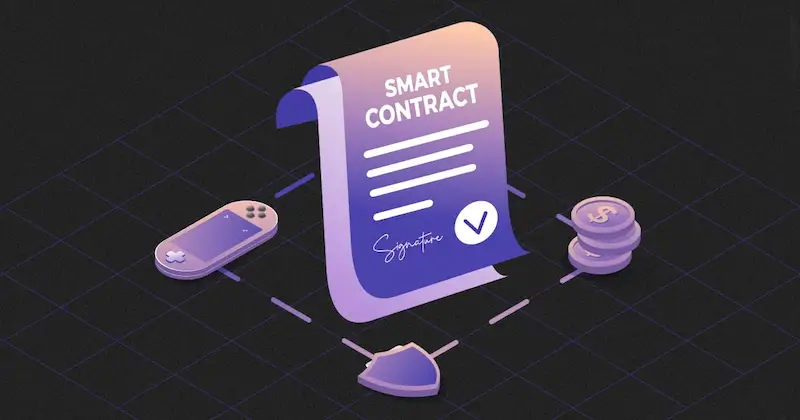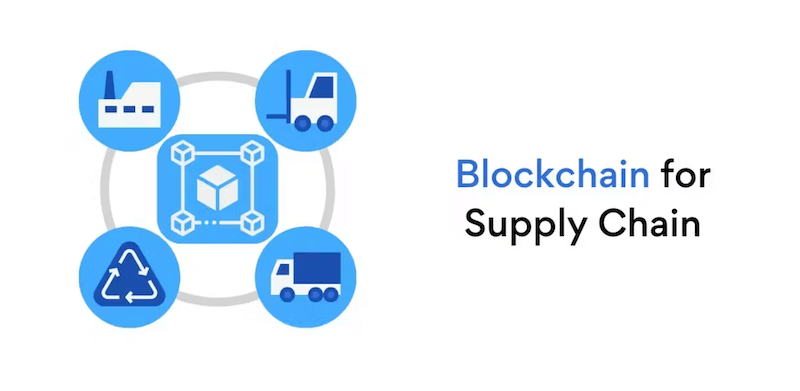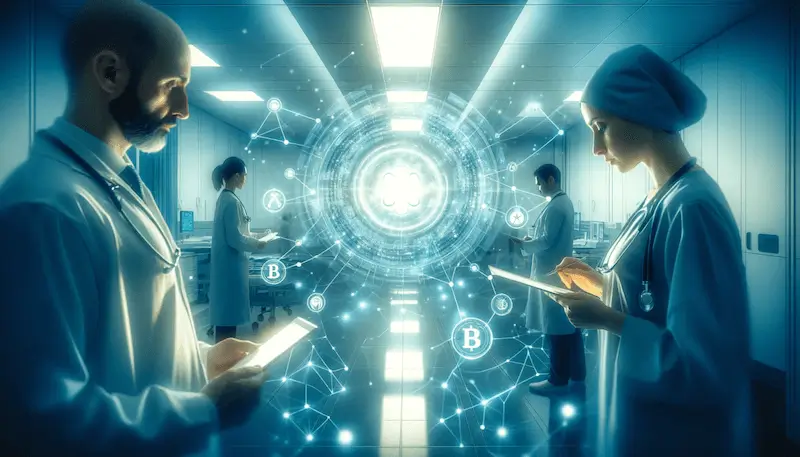Imagine a world where deals seal themselves and assets shuffle around with a click. That’s the mighty change blockchain smart contracts use cases are bringing to different sectors. They’re not just hype; they are revamping how we handle our money, track our goods, claim our property, and even do our part as citizens. Join me as I dive into the transformative applications stitching up seamless, trust-packed tapestries across industries. Buckle up, for it’s a thrilling ride through innovation that’s not just smart, it’s contract level brilliant.
Revolutionizing Financial Services with Blockchain
Implementing Self-Executing Contracts for Banking
Banks are using blockchain to change how we handle money. Imagine you borrow funds. With self-executing contracts, or smart contracts, the terms are in the blockchain. Once you meet the terms, say you pay back the loan, the next steps happen on their own. It’s like a vending machine. Put in the right amount, select your snack, and out it comes—no extra steps needed.
These contracts are helpful for banks in many ways. They cut down on paperwork and save time. With fewer mistakes and less need for middlemen, they are safer and cheaper.
Think of a regular contract. It can be unclear and lead to disputes. But a smart contract is clear to all and runs exactly as it’s set up. There’s no arguing with the code.
Ethereum is one blockchain that many banks favor for these contracts. It’s designed to make these handy tools work well.
Tokenization and Asset Management in Finance
Now, let’s talk about tokens. Not the kind you use at arcades. In finance, tokenization means turning things like houses or art into digital tokens. Then you can own, trade, or invest in these “tokens” over the internet.
Why is this cool? Well, normally, selling a building takes a lot of work. But if you split it into tokens, many people can buy parts of it, easily and fast. It’s like having a piece of the pie instead of the whole thing. This opens doors for everyday folks to invest in big-ticket items.
Assets managed this way bring out the best in blockchain. We call these dealings automated transactions. They are trusty and happen without a hitch. Plus, tokens can represent anything, even a person’s time or services, making them very flexible.
Smart contracts help here, too. They make sure buyers and sellers play by the rules without needing a third person to check everything. It saves everyone time and trouble.
These blockchain wonders aren’t just dreams—they’re reshaping how we think about money and ownership today. They put power in our hands and make financial deals straightforward. From banking to managing assets, blockchain is showing us a brave new world.
Enhancing Supply Chain and Logistics Through Decentralized Ledgers
Securing Transparency in Global Trade
Trade is like a huge web, connecting us all. We buy stuff from across the world with ease. But, how do we know if what we bought is good or even real? Here’s where blockchain helps. It’s like a digital ledger. No one can change it. So, everyone knows they can trust it.
Blockchain in financial services makes money move faster and safer. Banks love this because it means fewer problems. They use it to track money from one place to another, real quick and without error. This same tech can track goods across the globe.
In trade, knowing where stuff comes from is key. Decentralized ledger technology makes this easy. Say you buy a toy. With blockchain, you can see every step it took to get to you. This means trust in what we buy goes up.
Utilizing Smart Contracts for Improved Traceability
Now, imagine if deals could happen without waiting for a “yes” from someone. That’s what self-executing contracts do. They are like tiny robots in the blockchain that do jobs when certain things happen. No waiting needed. Smart contract applications are big in trade, making things faster and safer for everyone.
For example, think of a toy coming from far away. Each step of its journey is a deal that needs a green light. Ethereum smart contracts do this automatically. When the toy moves from a truck to a ship, the smart contract knows and tells everyone involved.
Supply chain transparency is a big deal. You can see where things are at any moment. This matters a lot when we need to be sure of what we’re getting. With clarity in trade, businesses work better together.
Real quick, let’s talk about moving stuff safely. Escrow services are like a safety net for your money in a deal. With blockchain, this can happen instantly and without worry. It secures your money until the toy you bought comes to your door.
Digital agreements on the blockchain are firm. They’re set in stone but not on actual stone—more like in a super secure cloud. These agreements make sure everyone does what they promised. Because of this, trust grows big time.
Automated transactions are deals that don’t need a person to say go. They go on their own when it’s right. And they’re quick, so your toy doesn’t get stuck waiting.
Smart contracts can even help keep things fair. Dispute resolution mechanisms are like fair play rules. If a problem pops up, these rules help sort it out without fighting. This keeps everyone calm and happy.
All this talk is not just about toys. It’s about making trade around the world better for us all. Using blockchain means less fake stuff, better trade, and happy buyers and sellers. That’s a win for everyone. So, whenever you hold a toy or any item from afar, remember all the clever blockchain work that got it to you.
Supply chains are complex, but blockchain and smart contracts make them a lot clearer and trustworthy. This means we can all look forward to safer, surer, and smoother trade.
Fostering Innovation in Real Estate and Intellectual Property
The Rise of Real Estate Tokenization
Real estate tokenization is changing the game. It breaks down homes, buildings, and land into digital shares on the blockchain. This lets investors buy parts of a property just like buying stocks. No big cash needed all at once. Blockchain in financial services brings this smart idea to life.
Let’s get into how real estate tokenization works. Take a big building. Split its value into many small tokens. Each token is a share you can own. You buy these tokens with digital money on the blockchain. It’s like owning a piece of the pie without having it all.
Tokenizing property has big wins. Investors with less money can now get in the game. Owners sell bits of their property without losing control. And the deals happen fast and clear, all recorded on the blockchain. This uses decentralized ledger technology. Here’s why that matters. It keeps every token and deal safe and sound, with no room for funny business.
Tokenization also lets more people invest across borders. A guy in Japan can own a bit of a building in New York. This was hard before, but now it’s just a few clicks away. It helps make investing fair for everyone, no matter where they are.
Protecting Creators’ Rights with Immutable Records
Now, let’s talk about artists and inventors. They make cool stuff, but others might steal it. That’s no good. So, they use the blockchain to protect their work. It creates a record no one can change or erase. We call these immutable records. They prove who made something and when.
Smart contracts play a guard here. Imagine you write a song. A smart contract can make sure you get paid each time someone plays it. This is royalty distribution with trustless protocols. The good part? You don’t need a middle guy taking a cut for no reason. It keeps things simple and honest.
Think about selling art or music online. With Ethereum smart contracts, artists have new ways to sell. They can even use tokens, called NFTs, to show their work is the real deal. Fans can buy these knowing they’re getting something special, not a fake.
Blockchain is not just about money. It’s a shield for creativity. It gives power back to the ones who dream and make. With smart legal agreements, artists feel safe to share their magic with the world.
Blockchain’s helping hand doesn’t stop here. It’s big in healthcare, gaming, and even how the government runs. It makes sure things are fair and square in ways we never saw before.
So there you have it. Real estate tokenization opens doors for many to invest. And creators? They sleep tight knowing their work is safe, all thanks to blockchain magic.
Broadening the Horizon: Blockchain in Healthcare and Governance
Streamlining Patient Data Management with Blockchain Solutions
Today, healthcare faces big data problems. Think about all the details doctors need. Medical history, treatments, tests—tons to track. Errors or leaks in this data can hurt us. That’s where blockchain comes in. Picture a system where your medical details are safe, clean, and easy to share, only with the right folks.
With blockchain, we build a solid record of your health journey. Can blockchain keep patient data safe? Yes, it secures data using complex math and strict rules. In this space, blockchain shines by making sure that once data is in, it stays unchanged—eternal, without chances for foul play.
Decentralized ledger tech steps in as a guard for patient data. It keeps your info in many places at once, not just one. That way, if someone tries to mess with the info in one place, the system spots it. No single point of failure means your details are safer.
Say a hospital worker needs to see your records. The blockchain can show this is okay and share the details fast, with no mix-ups. It keeps a neat track of who sees what, too.
Across the planet, hospitals can tap into this safe data pool. They can use your health info to make sure you get the care you need. We’re not just cutting waste; we’re saving lives.
Increasing Public Trust Through Transparent Voting Systems and DAOs
How can we trust votes are counted right? How do we keep elections clean? Blockchain can help here, too. Now, we can have voting systems that are clear as glass and harder to crack than a diamond. Votes locked in a blockchain stay put. They can’t be swapped or lost. Every voter can check that their vote is in there and right. This trust is what we need in our votes.
DAOs, short for Decentralized Autonomous Organizations, change the game, too. They let us run groups without one big boss. All decisions relay through smart contracts—automatic rules that apply to everyone the same way.
DAOs can help in making decisions, sharing money based on set rules, or many things where fair play is key. They are like having a robot referee that everyone trusts.
What do DAOs mean for governing? They mean clean, clear rules with no bias. Every person in the DAO gets a voice, and the system makes sure of that. We get more eyes on decisions and a fair share in what happens.
With DAOs, your small club or a whole city could run smoother. Everyone carries a piece of the power, and the blockchain makes sure it works right.
This smart tech isn’t just a leap for keeping data or counting votes. It folds into many fields. Like how we manage buying and owning houses, how artists get paid for songs, and even to power our cars and homes.
Blockchain’s opening doors to a world where trust is built-in, where every piece of data or deal is firm and fair. This is how we move forward and make things better for us all.
In this post, we’ve explored how blockchain is changing the game across industries. We looked at how self-running contracts make banking better and how tokenizing assets can shake up finance. We saw blockchain bring clarity to global trade and help track goods every step of the way.
We also saw real estate and ideas get a boost. Real estate gets easier to split and sell, and smart records keep creators’ rights safe. In healthcare and governance, it helps manage patient info well and make voting and community decisions clear and fair.
So, to wrap up, blockchain isn’t just tech talk. It’s a key player now in many fields. It’s making our data safer, our deals clearer, and our trust in systems stronger. And that’s just the start. We’re right at the edge of an exciting future where blockchain can open doors we didn’t even know were there!
Q&A :
What are the most common use cases for blockchain smart contracts?
Blockchain smart contracts are utilized across various industries, offering a wide range of applications. Some of the most common use cases include:
- Automated Payments: Smart contracts can automatically execute transactions when certain criteria are met, eliminating the delay in traditional payment methods.
- Supply Chain Management: They streamline supply chain operations by providing real-time tracking and ensuring compliance through automated verifications.
- Real Estate Transactions: Smart contracts can automate property sales, lease agreements, and record-keeping, making the processes more efficient and transparent.
- Voting Systems: Offering a secure and tamper-proof voting mechanism that ensures integrity and trust in the voting process.
- Legal Processes: They can automate the execution of legal agreements and ensure that contract terms are enforced without the need for intermediaries.
How do smart contracts on blockchain improve security?
Smart contracts are encoded on a blockchain, which inherently enhances their security due to several key features:
- Immutability: Once a contract is created on a blockchain, it cannot be altered, which helps prevent fraud and unauthorized changes.
- Decentralization: Without a central point of control, there’s less risk for a single point of failure, making it harder for attackers to compromise the system.
- Cryptography: The use of cryptographic techniques secures the transactions and contract executions, ensuring that only authorized parties can initiate and validate transactions.
Can blockchain smart contracts be used in government operations?
Yes, blockchain smart contracts have the potential to revolutionize government operations by offering:
- Improved Transparency: Blockchain provides a transparent ledger, allowing for public verification of government actions where appropriate.
- Increased Efficiency: Smart contracts can automate bureaucratic processes, reducing the time and resources required for completing government tasks.
- Enhanced Security: The secure nature of blockchain technology ensures that government records and transactions are protected from tampering and fraud.
What are the challenges of implementing smart contracts within traditional industries?
Despite their potential, implementing smart contracts within traditional industries faces several challenges:
- Legal Recognition: Smart contracts may not always be recognized by current legal frameworks, which can create uncertainty and legal risk.
- Integration Issues: Integrating smart contracts with legacy systems and business processes can be complex and costly.
- Technical Expertise: There’s a need for skilled professionals who understand both the technology and the industry to develop and maintain smart contracts.
- Regulatory Hurdles: Regulation of blockchain technology and smart contracts is still evolving, potentially hindering adoption.
How do smart contracts enable trustless transactions?
Smart contracts enable trustless transactions by automating the execution of an agreement based on predefined rules, thereby removing the need for intermediary validation. This direct interaction between parties promotes a trustless environment where:
- Automatic Verification: The contract conditions are self-verifying, and the fulfillment is automatically executed by the program code.
- Transparency: All parties have access to the smart contract terms, and the blockchain ledger ensures that all transactions are transparent and trackable.
- Security: The decentralized and encrypted nature of blockchain prevents tampering, ensuring the transactions are secure and trustworthy.



